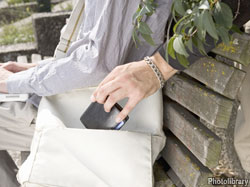
(ARA) – You’re not the only one looking forward to your vacation or business trip. Identity thieves relish your travel time too, because your vital, personally identifying information may be more exposed when you’re traveling than when you’re at home or work.
You work hard to establish good credit, and have built a reputation for paying your bills on time and making responsible investing, saving and spending decisions. Yet one overflowing mailbox or a stack of uncollected newspapers on your front step can help unravel all your efforts; they’re a red flag to thieves that you’re away from home.
Before you head to the airport or start out on your long road trip, take some precautions to safeguard against identity theft – even when you’re not at home.
Before you leave
* Consider signing up for an identity theft protection product like ProtectMyID.com, a part of Experian. You’ll receive alerts by mail, e-mail or text message whenever a key change is made to your credit accounts, like a new credit application. You’ll also be informed if a change of address action is initiated, a popular method for thieves to have bills rerouted from your home to keep you in the dark about the theft. Additionally, if your wallet is lost or stolen while you’re on vacation, ProtectMyID.com’s fraud resolution agents can help you resolve identity theft issues. Learn more about protecting your identity while you travel by visiting www.ProtectMyID.com.
Below, you’ll find useful tips to help you stay secure while traveling.
* Ask the post office to hold mail delivery until you return. Request a “postal hold” rather than a “vacation hold” to avoid alerting postal clerks that you will be gone.
* Halt newspaper delivery and any other automatic deliveries, like bottled water.
* Clean out your wallet. Lock up your Social Security card instead of carrying it with you, and remove credit cards you don’t need; carry only essential identification (a passport or driver’s license) and one or two credit cards. If your health insurance card has your SSN on it, make a photocopy of the card, black out all but the last four digits of the number, and carry that with you instead of the original.
* If your neighborhood has a Retired Senior Volunteer Patrol (RSVP), contact them and ask for a courtesy check of your home while you’re gone.
* Even if you have a housesitter coming in or a neighbor with a key who’ll check the place while you’re gone, lock up important personal documents like birth certificates and Social Security cards.
While on the road
* Store valuables in room safes if your hotel offers them, or in the hotel’s safe if in-room ones are not available. Lock up items like laptops, PDAs, jewelry, passports and documents that contain your personal information.
* Be aware that pickpockets frequent high traffic areas that attract a lot of travelers. They’re rarely interested in your cash. They want your SSN, checks and driver’s license. Don’t carry checks or your Social Security card, and store important pieces of ID, like your passport and driver’s license, in a fanny pack or travel pouch worn inside your clothing.
* Remember when you’re out and about on your trip – at the airport, in a restaurant, visiting attractions – that you’re in public. ID thieves may look over your shoulder to snatch identifying information, or listen in on your cell phone conversation. Caution and discretion in public can help protect against identity theft.
* Carry photocopies of all your travel documents, including plane tickets, hotel reservations and passports. Keep them separate from the originals.
* Use credit cards while traveling, rather than debit cards. A debit card gives thieves a direct line to your bank account and, when used to make a “credit” purchase with a signature, don’t require the user to enter a PIN. Also, beware of fake ATM machines, which are known to be placed in high traffic tourist areas.
Courtesy of ARAcontent





